Carol Newman Cronin's Blog, page 56
July 31, 2013
Where Books Meet Boats: Situational Awareness
Recently I read Gary Jobson’s column in Sailing World about making your own luck through situational awareness. It sounds totally obvious: those who notice what’s off most people’s radar see opportunities others miss. (And then those others say afterward, “She was just lucky.”) In sailboat racing, it’s easy to see who has made big gains; scores are kept, and each competitor can see what the others are doing around the course.

In writing as in sailboat racing, situational awareness can help you see opportunities others miss.
Where those gains are not so obvious is in writing. We all know when we like a book, but we usually don’t notice all the details that are worked in, details that could’ve been left out because they aren’t doing the heavy lifting of moving the plot from point A to point B. And while most writers can tell a decent story, it’s those more subtle pieces of information we often remember long after we read the last page. Information that a writer with less situational awareness would miss.
Like sailboat racing, writing requires attention to craft. But I’m not sure that this situational awareness skill can really be learned in either case. You either see the wind filling up the course, or you don’t. And you either live with your characters full time, or you don’t. The character trivia that enriches our stories comes out of sitting together, quietly, like old friends rocking side by side on a summer porch. We need to understand their lives outside what happens on the page.
For me, “good writing” is when a tiny word or phrase is worked into a story that creates depth well beyond the scope of the specific detail. Sometimes I catch myself thinking, “That must’ve taken a lot of research to find”, and I might even wonder if it was worth the time for a one sentence aside. But added together, all those asides are what gives a piece its impact; it’s why we read, and why writing can’t really be replaced by watching, or anything else.
Gary Jobson is a writer as well as a sailor, so he probably makes his own luck in both arenas. The process, after all, is the same: widen your gaze, try to see something no one else sees, take the time (and develop the nerve) to follow your instinct as far as it leads. Only then can your ideas morph from idiotic time sink into regatta-winning advantage.
July 17, 2013
Book Review: Sipping “Spilled Coffee”
“I like stories within a story,” author J.B. Chicoine says—one of the many reasons I love her books. When I reviewed her first novel, Uncharted, I even admitted to some authorly jealousy for the unexpected twists and turns she managed to weave in between a series of images that put me right into each scene. So even though her second book didn’t involve sailing, I was still very eager to tear off the plastic cover.
The opening scene (in a coffee shop, of course) drew me in quickly, just as I expected. Ben Hughes meets a potential love interest, drops hints about his recently ended engagement, and lets us know he’s on a curious mission involving a lakeside summer cottage, some dark personal history, and a dysfunctional family…. I couldn’t wait to find out what happened next.
And eventually, I did, though at times Ben’s hints came slower than a brewed morning cuppa. A droplet of information here… a hiss of detail there… I wanted to know more, sooner. Telling a story that happens in the past is a delicate tightrope between “just enough” and “too much,” and the first third of this book may err slightly toward not enough information and too much foreshadow. But since I so much prefer that to being told too much too early (a frequent mistake in my own writing), I stuck with it. Besides, I couldn’t put it down until I’d figured out what was going to happen to Benjamin and his first love, Amelia. (Everyone else calls her “Amy”, and she is the only one who calls him “Benjamin,” one of the many tiny details that made them so real to me.)
Once I had enough information to draw my own conclusions about the ending, I enjoyed the steady drip, drip, drip of details that were carefully woven into the narrative. With each new step back into the past (artfully marked with a pocket watch picon), the story unfolded. And then in spite of my preconceived notions, the ending completely surprised me—another reason I love Chicoine’s books.
Even as I am still absorbing this one, J.B. Chicoine is already working on a new story—and I can’t wait to read it. Better to sip spilled coffee slowly than to get dowsed with a firehose of information, which is the more standard approach in most novels.
Learn more about the next book and this one on J.B. Chicoine’s blog.
June 28, 2013
Boats, Books, and the Pursuit of Excellence
I have a friend who I’ll call “Peter.” He believes everything (and I mean EVERYTHING) can be done just a little bit better, each and every time. Even when he wins every single race of a regatta, he’s still talking afterward about how he could’ve been a little bit faster, started a little better, or taken better advantage of a situation by putting his boat in a more strategic place.
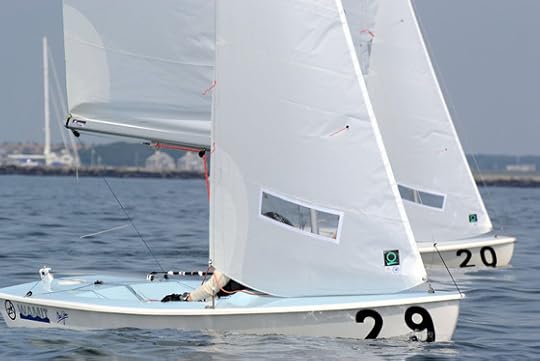
Perfect sail trim means going just a little faster than the rest.
I have another friend I’ll call “Randy.” She’s a successful author, at the other “end” of my professional spectrum, but she’s a lot like Peter. Before her first novel had even come out, she was already talking about how she could do a better job with her second—and then mentioning a few ideas she had for her third.
Randy and Peter have never met, as far as I know. And books are much more unique than sailboat races. But these two share a distinct and rare personality trait: the pursuit of excellence. While both are proud of their past accomplishments, their primary focus is forward: how can they do even better next time?
The last friend I’ll introduce is “Sailor Sam.” I don’t know him as well as Peter and Randy, probably because I gravitate toward people who push themselves even harder than I do. But from my friendly view across the boat park, SS seems perfectly content to show up at regattas and make the same mistakes over and over again, digging a multi-year rut ever deeper with each poor finish.
When I study people I don’t know (in airports, truck stops, or restaurants), I can quickly pick out the Peters and Randys of the world. Never satisfied, they are always striving to improve: themselves, their friends, their situation. Whatever motivates these folks (maybe family or selling, rather than sport or sentence structure), they look for every chance to move their worlds to a higher level.
And that’s what sets them apart from the sea of “Sams” that makes up the bulk of most crowds. How can so many people—most people—be content to make the same mistakes over and over again, rather than striving to be better? I can understand that what inspires me (sailing and writing) is not what inspires most people, but I just don’t get how anyone could be happy doing nothing to improve on whatever it is that gets them out of bed in the morning.
So as I strive to get better with each regatta I sail and every story I write, I surreptitiously study the Sams as if they were strange creatures from a different planet—even though they make up most of the population on this one. And when I realize I still don’t understand what makes them tick, I go back to my comfort zone—learning from the Peters and the Randys of the world how to sail faster and write better.
June 13, 2013
Criticism From Shore: It’s All In the Delivery
I was just getting into a groove on my stand up paddleboard when the early morning quiet was shattered by a fisherman yelling at me from the shore. “Hey, couldn’t ya stay farther out? Jeez, how rude.”
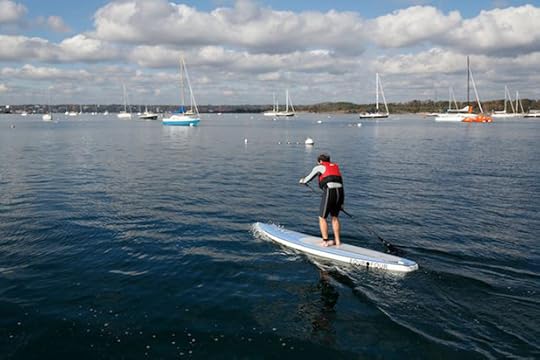
Harbor beauty is easy to appreciate from on top of a stand up paddleboard. Photo: PaulCroninStudios.com
I spluttered a bit trying to come up with a response. I considered the truth: “I usually come in even closer, but I saw your line.” And a few moments later, a sassy retort occurred to me: “Whaddya think, you own the shoreline?” But by then, of course, the response time had elapsed, so he had the last word. I paddled on, turning my aggravation into an accelerated stroke rate.
The fisherman (who, I later learned, has a reputation for rudeness himself) has probably forgotten all about our interaction (though he may now assume that all stand up paddleboards are completely inconsiderate). But it started me thinking about criticism, how unconstructive some comments can be, and how much the delivery affects reception.
This isn’t a new topic; we all know that constructive criticism is more likely to be taken in the spirit intended if sandwiched between two compliments. But that’s not as dramatic, and it’s certainly not what TV promotes. Getting the final word in as loudly as possible is what gets noticed in the stew of noise and distraction we all take for granted these days.
[In an ironic twist, I recently wrote a post on boats.com called Why SUP? Top 10 Reasons to Go Paddleboarding. And I included a video of a paddleboard meant for fisherman. So maybe I should assume this guy was jealous (I was on the water, he was stuck on the beach) and send him the link?]
My response would have been totally different if he’d said, “Hey, next time could you paddle a little further away? That way I can cast without worrying about hitting you.” Instead of fuming about his rudeness, I would’ve planned to adjust my course in future. Which would’ve been better for him in the long run, since my snap instinct now is to paddle even closer, just to prove that I have a right to be there too.
But if he’d been more polite, I would’ve replied with something equally nice. “Of course, sorry!” Which means I wouldn’t have spent the next 10 minutes of my paddle thinking up sassy retorts.
And that means I wouldn’t have dreamed up this blog post. So maybe it all worked out just fine.
Photo courtesy PaulCroninStudios
June 5, 2013
Drink to Win: Fizzy Hydration from Hammer
Last weekend I achieved a personal best, finishing second overall at the 2013 Snipe Colonial Cup in Annapolis. And in addition to thanking my teammate Kim Couranz, I have to send out a very special and heartfelt thank you one of our long-time sponsors, Hammer Nutrition.
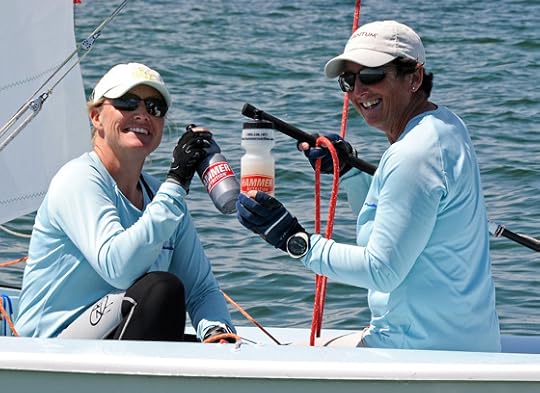
Kim and I showed off our Hammer water bottles to photographer John Payne.
I love sailing with Kim. She’s smart, she’s funny, and she knows me so well she can tell when I’m about to do something really stupid. What we’ve both realized is that usually that’s because I’m a little behind on electrolytes (no, really). So between races, she’s always telling me to “Drink.”
Small sailboat racing can be very intense at times and very boring at other times, but our hands are almost always busy. While racing, it’s usually impossible to grab even a sip of water; we’re too busy adjusting sails and keeping the boat going in the right direction. When it gets hot and humid, (like it did this past weekend in Annapolis), I’m usually a bit behind on electrolytes by the time we finish our first one hour race. After two races, my mouth is dry; after three races, I’ve got the beginnings of a headache.
And if it’s a four race day like last Saturday, I’m usually not much fun to sail with by the end of the day.
Dehydration really does make me stupid—ask any of my three teammates about day two of a certain World Championship back in 2003, and they’ll tell you how badly I sailed after not hydrating well on day one. Even before I have any other obvious symptoms, my split-second decision-making ability deserts me. And since most of our races involve a constant stream of such choices, that can make for a very disappointing day.
Which is why I was so excited to discover this past weekend that Hammer Nutrition’s Endurolytes Fizz can actually catch me back up again once I get behind.
I’ve used Hammer products for fifteen years, and their Heed (electrolyte replacement) was a great step forward for me from water and better known fluid replacement drinks. But once behind, I wasn’t ever able to catch up again.
Last summer I discovered Endurolytes caplets, which was the first time I’d ever felt a dehydration headache dissipate so quickly… but the Fizz seems to be even more effective. Best of all, they’re easy to carry and consume; last weekend I stashed a tube of tablets in my lifejacket pocket and between races, I’d drop one into my water bottle. In seconds, I had a great tasting beverage—and I swear that with each sip, I could feel the storage tank of each individual brain cell filling up.
Kim and I discussed whether Fizz works better because it also encouraged me to drink more fluid, compared with a mouthful to wash down a few Endurolytes caplets; the smart people at Hammer probably have an answer for that. All I know is that I don’t have to worry about competing in hot climates anymore. What used to be a real personal weakness has turned into a strength. Thank you, Hammer!
And yes, I am a Hammer-sponsored athlete. I signed on with them several years ago because of two other products I’ve used for over a decade: Whey protein and Recoverite. The first gets me going in the morning, and the second makes sure I’m ready to go the next day too. In between, I now know I can keep going in any temperature/humidity combination, thanks to Endurolytes Fizz.
So when Kim tells me to “Drink”, now I know what kind of mickey I’ll be slipping into my own water bottle.
Photo courtesy John Payne Photography
May 10, 2013
Our Sailing Family: Losing Bart Simpson
It’s been a tough couple of months for the sailing family, a loose-knit collection of folks around the world who—in a wide variety of ways—put our sport at the top of our priority lists. First we lost Charlie Leighton. Next came the news of Magnus Olsson’s unexpected stroke. A few days ago, a friend discovered his father had passed away aboard his boat. And yesterday, Andrew “Bart” Simpson was lost while training with Team Artemis. The photos have piled up in my downloads folder, happy smiles standing out in tanned faces, bringing back memories every time I search for a file.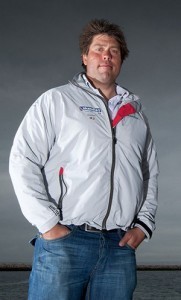
I first met Bart when he was training in the Finn class, shortly before he joined forces with Ian Percy—a team that would go on to win a gold and a silver at the next two Olympics. I didn’t know him well, but he was a familiar face around the boat park. And now the sport that brought us together has stolen him away far too soon from his family, friends, and teammates.
I don’t think sailing has become more dangerous, though I’m sure calls will go out to “ban those massive America’s Cup machines” or set maximum speed limits on boats, or anything that might be done to make us all feel safer on the water. As Gael Pawson puts it, “Simpson’s death will undoubtedly fuel the debate over whether the current generation of boats is simply too powerful and dangerous.” (Read Tragic Loss of British Sailing Legend Andrew Simpson)
 What has changed is how quickly we learn about tragedies like this one. A few years ago, I would’ve learned of Bart’s death within a day or a week, depending on where I was and who I was with. Now, thanks to Facebook, I and most of my sailing friends around the world heard the sad news within hours. It was quite obvious who hadn’t yet found out, since posts were still going up about dinner with friends, sunsets, a rollicking sail in a stiff breeze. As the news spread, more and more feeds turned solemn. A few friends even changed their profile picture to the cartoon character Bart Simpson, a subtle but touching tribute to this great sailor with a great smile.
What has changed is how quickly we learn about tragedies like this one. A few years ago, I would’ve learned of Bart’s death within a day or a week, depending on where I was and who I was with. Now, thanks to Facebook, I and most of my sailing friends around the world heard the sad news within hours. It was quite obvious who hadn’t yet found out, since posts were still going up about dinner with friends, sunsets, a rollicking sail in a stiff breeze. As the news spread, more and more feeds turned solemn. A few friends even changed their profile picture to the cartoon character Bart Simpson, a subtle but touching tribute to this great sailor with a great smile.
So we go on with our lives and our sport, sadder and sadly not much wiser, newly reminded yet again of our small and interconnected family around the world. I like to imagine that all of our recent losses are lined up on a perfect starting line together, feeling that gut rush of adrenaline as they trim in the main to accelerate just one fraction of a second ahead of the boat to windward. But here’s the kicker—what boat would they be sailing? Now that Bart has registered for this final, perfect regatta, it can’t be the Star boat… that just wouldn’t be a fair contest.
April 19, 2013
A Woman’s Right to Compete: Thank You, Micki King
I’ve never paid much attention to “women’s sports.” In sailing, outside of a few select events like the Olympics and the America’s Cup, women can sail against men if they want.
And then this morning, Micki King reminded me once again how lucky I am to take such competition for granted.
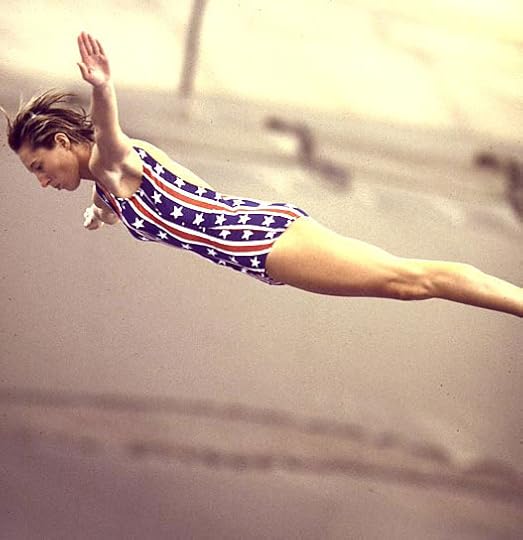
Micki King was a gold medal favorite at the 1968 Olympics but broke her arm on the board. She eventually finished 4th, then came back to win gold in 1972.
Micki won a gold medal in diving at the 1972 Olympics, and she’s been a friend to women’s sports and the Olympic movement ever since. I was lucky enough to meet her through my work with the U.S. Olympic Committee Athlete Advisory Council—an organization she helped create in the late 1970s. She also happens to be a retired Air Force colonel, and in 2012, she was awarded the prestigious USOC Olympic Torch Award.
But it’s Micki’s history that impresses me most. She doesn’t talk about it much, preferring to discuss how much work lies ahead to further equality in women’s sports and access to sports for all in our schools. But in a recent interview with the Women’s Sports Foundation, she described an unexpected opportunity in the 1960s that eventually led her to Olympic gold—in part because of the laziness of one coach:
“When I got to Ann Arbor to attend the University of Michigan, I quickly found out that there was a men’s pool and a women’s pool – and women could not go to the men’s pool. But the Michigan men’s diving coach, Coach Kimball, used to visit the women’s pool every week and hold training sessions for any women who wanted to learn how to dive. After about a semester or so, he got tired of driving all the way to the other side of campus and so he brought us over to the men’s pool. There were no locker rooms, no showers, nothing for us. But we thought we were lucky just to be inside the men’s pool because that is the way we grew up. We were basically trained from birth to think that way.”
(I’m guessing Micki’s quiet determination and winning smile might have influenced the coach, too, though that’s pure speculation—based on a few luncheons at her side.)
So while I was learning to race (sometimes as the only girl in the fleet), Micki was working for the simple right to train in the men’s pool. I will try to better appreciate the luxury of my carefree attitude to women’s sports and the right to compete.
And that luxury is shared by most young girls today. In another story, Micki talked about introducing a 1992 gold medalist relay team member to a local Kiwanis luncheon as the perfect product of Title IX:
“But when I introduced her to come to the podium and speak, she stayed seated, dead still. I even had to come down from the podium to coax her up. Finally she whispered in my ear these words I will never forget: ‘Micki, I had no idea it wasn’t always there.’ And in that moment, I realized she honestly didn’t know that her mother hadn’t had all the opportunities that she did.”
So thank you Micki, for the luxury of taking for granted the right to compete against anyone I choose. You’re a gold medal inspiration to the rest of us—and please keep reminding us how far we’ve come.
Read the entire interview, Five Questions with Micki King
Note: This photo was included in 100 Memorable U.S. Olympic Moments
April 2, 2013
Book Review: Powder Burn Keeps Its Powder Dry
I probably would not have picked up Powder Burn if I didn’t know author Mark Chisnell. A recovering professional sailor, Mark did warn me up front that there are no boats in his latest thriller—but “there is snowboarding.” There’s also a lot of suspense, a strong and independent protagonist (who happens to be female)… and an epilogue that delivered just the right amount of added twist, forcing me reconsider the story all over again in a different light.
I won’t give away the ending. But I will tell you that Powder Burn kept me turning the pages, taking me to a place I’ll likely never go—a remote country locked within the Himalayas that has been occupied by a foreign power. Though the pacing was never rushed, it also never slowed down—even between snowboarding runs to escape the pursuing enemy. Mountain climbing, modern and not so modern warfare, a magic sword, a developing love interest for main character Sam Blackett—this story has something for everyone.
As for Sam, she at times seems a bit too good to be true. A self-described “glass-half-full kind of girl,” Sam has a vast array of skills that seem to come into play just in time to save the day—though it is her boyfriend-in-the-making, Pete, who navigates the snowboard that gets them away from two different sets of pursuers.
But that proves how totally I was drawn into this story: even while seeing it through Sam’s eyes, I was “there:” frostbitten but free on a windswept mountain before being captured, and then warm but worried in a whitewashed cave lit only by yak-butter lamps. I could practically smell the unwashed bodies, the “burning, rancid oil” that “provided more smell and atmosphere than light.”
And that’s what I love about fiction. I can visit places I’d never go to otherwise, all from the comfort of my window seat. Thanks, Mark, for taking me on such a great Himalayan adventure—and for surprising me with an ending that will keep me smiling, long after this review is finished. I can’t wait to see where Sam takes me next.
Powder Burn launches today, and you can grab a sneak peek on Mark’s website. You can also learn about the evolution of publishing from a writer’s perspective by reading Powder Burn – Independently Publishing a Novel in 2013.
I hope you enjoy meeting Sam (and, by that weird connection between character and author, Mark) as much as I did.
March 21, 2013
Mind Declutter: Gone Sailing
I have a confession to make: I was out of the office last week.
No, I wasn’t sick. I was sailing.
Yes, I worked a few hours each evening. But that was really just to keep up with email, answer urgent questions, and put in enough time to (hopefully) allow me to go sailing again in a few months.
And it was fun.
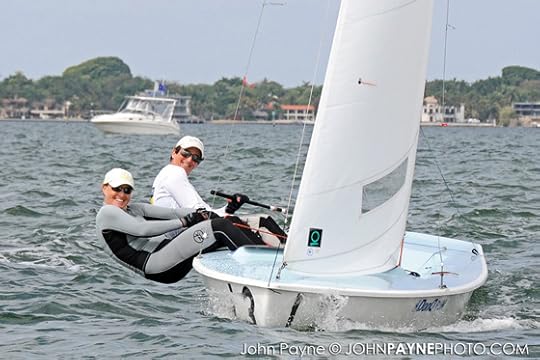
Kim Couranz is a fantastic teammate. And she finishes ahead of me in every single race we sail.
There are definitely a few things that fell behind in my absence. Longer term projects simmering away need more brain power than I had available after normal business hours. And that’s great, because it means I do make a difference when I’m around.
But feeling needed is not the best reason to get away. It’s not even the second best reason. The second best reason is that it makes me realize everything at work will keep revolving without me for a week, or even longer, thanks to the rest of the boats.com editorial team.
And the first best reason? I’ll let attorney Amy Benner, who was also on her first escape from a real job last week, cover that one:
“One might think that taking time out from working in order to get myself and my gear to Clearwater, then exerting the energy and suffering required by sailing six monster races in big breeze over three days, would have certainly worn me out for work. But now that I’ve returned to the office, I feel energized and my mind has been cleared of excess clutter.”
Read the rest of Amy’s report from the Snipe Midwinters
Just like Amy, I too came back to my desk energized and excited to be back at work.
Going away is hard to do, unless there’s a good reason: family reunion, bucket list destination. Fortunately, I have the Snipe. The Winter Circuit, strategically scheduled for mid-March, is the perfect late winter escape—from weather, work, and winter doldrums. And it’s a reunion of the Snipe family, a small but surprisingly close knit fraternity from around the world.
Oh—the results? Well, frankly, the two events didn’t go as well as we’d hoped. Thanks to the rust that had collected on our brains over the winter, and a few equipment issues, we could only scrape into the top ten on the last day of the second regatta.
But in the long term, that doesn’t even matter. The rust is gone, my mind is clear, and I’m ready for another solid push… if only to build up the hours I need to take off for the next event.
Photo courtesy John Payne Photography
February 26, 2013
Lucky 13: My Favorite Charlie Leighton Story
This post originally appeared in a slightly different form on the boats.com blog.
Charlie Leighton went to the great regatta in the sky this past weekend, and he will leave behind a gaping hole in many lives. By the time I met him, he was the Executive Director of USSailing. Before that, he’d held many other titles: Commodore. Chairman, CEO, Director, Trustee. And he was still racing sailboats, a great reminder of the lifelong-ness of our sport.
The first time I remember really talking with Charlie was on a tour of his private gym. My two Olympic teammates and I had been invited up to the sunny, open room that housed several machines I’d never seen before. “Try this one out,” he said, throwing me yet another one of his infectious grins. “See how much of your body weight you can lift.”
I stepped/sat onto the thing, grabbed the handles, and lifted.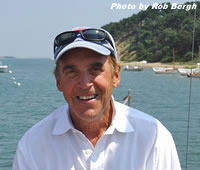
“13, wow! I’ve put most of the Sailing Team members on this, and so far that’s a record. Great job!” He pumped my hand, and I walked away feeling like I’d really accomplished something. For an almost-retired Olympic athlete, it was nice to be reminded that I could still compete with the young upstarts.
So it would’ve been a memorable moment, even if he hadn’t greeted me for the next few years as “13! How’re you doing?”
I didn’t know him that well or spend that much time with him, but I was always impressed with his enthusiasm and his vision. Almost single-handedly he created the medalist fundraising program for Olympic sailing that will live on in his absence, because (in the words of former Olympic Sailing Committee Chairman Dean Brenner), he “taught us how to do it.” And while he was raising money, getting to know athletes, and spreading goodwill, he brought many people together as members of the Olympic sailing family. He was uniquely able to bridge the typical gaps between donors and sailors (in age, income, and ability) with a warm smile, a firm handshake, and a goofy opener. (“Let me introduce you to Lucky 13.”)
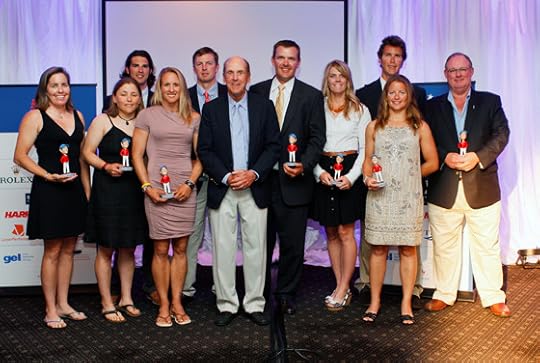
The annual USSailing Team awards are lovingly called the “Charlies”. Here he is with the 2011 winners.
Charlie was always Charlie, no matter whether he was speaking before a board of directors, riding in a powerboat watching racing, or piloting his own plane up the coast of New England. Friendly, caring, personal, with just enough of a glint in his eye that it was all too easy to discount the wisdom of his words. He’ll leave behind a large gap of warmth in many lives.
And I will really miss being “13.”
For more on Charlie, including quotes about him from people around the sailing world, read USSailing’s Sailor of the Week from September, 2010.



